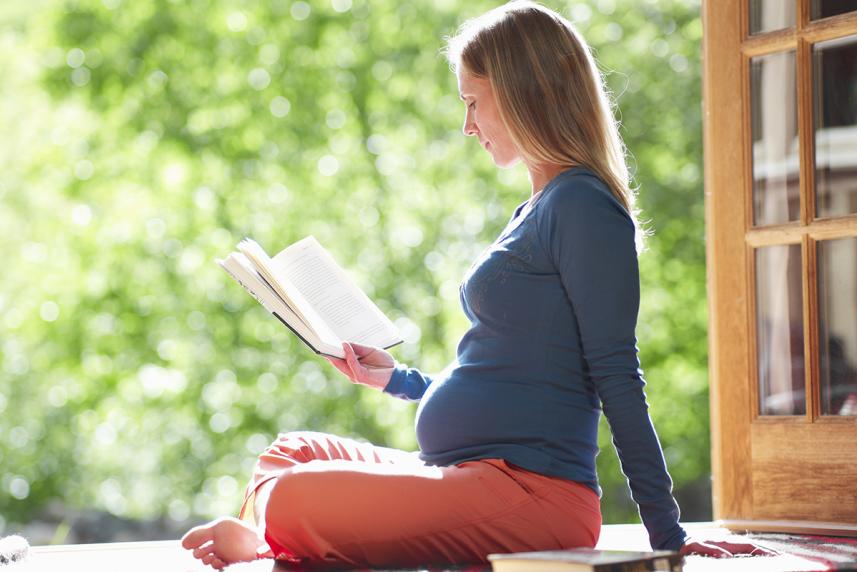
The Blue KC Care Management app makes it easy to get your pregnancy questions answered. Download it now and use access code kclinkbegin to connect.
Emotional ups and downs are normal when you’re expecting. But if you feel sad all the time, you might need to get help.

Pregnancy can be a thrilling time. Every day brings changes as your pregnancy evolves. And suddenly there are many things on your to-do list: buying baby clothes, going to prenatal checkups, thinking about baby names.
But along with all that excitement, there are a lot of unknowns, especially if you are pregnant for the first time, says ob-gyn Iris E. Dori, M.D. Add in pregnancy hormones and you may experience big changes in your mood.
The biggest mood changes typically happen during the first and third trimesters. You might feel happy one minute, then find yourself sad the next. Or maybe you’re short with your partner or coworker. It can feel like you’re not necessarily in control of your own emotions.
Here’s what can be behind those ups and downs, which symptoms are normal, and when you should reach out for extra support.
Pregnancy hormones are a big reason your emotions will change. “Estrogen levels are going up, and your progesterone levels are going up. And any change in your hormone levels can affect your moods,” explains Dr. Dori. Estrogen and progesterone are two important hormones that rise during pregnancy to support a developing fetus.
Your body may also feel uncomfortable, thanks to symptoms such as tender breasts, joint aches, nausea, backaches, and heartburn. Those symptoms are usually normal, but they may be new to you.
Combine those symptoms with the hormone shifts and it’s no surprise that mood swings are common in pregnancy.

The Blue KC Care Management app makes it easy to get your pregnancy questions answered. Download it now and use access code kclinkbegin to connect.
How can you determine if your mood swings are something that needs more attention? You can still manage your daily to dos, says Dr. Dori. That means being able to get up in the morning, go to work, take care of your other children, and enjoy the things that you normally do.
To tame the ups and downs, be kinder and gentler to yourself. Try to get good-quality sleep (yes, it’s tough) or take naps when you can. Spend time with people you love, either on the phone or in person. And stay active.
Sometimes those strategies aren’t enough, though. You might find yourself sad, tired, or unable to get to your tasks most of the day. Or you might not feel like doing favorite hobbies and activities.
When low mood or worries take over your life, you could be suffering from pregnancy depression or anxiety.
Prenatal depression is a mood disorder that happens during pregnancy. It affects 1 in 10 pregnant women, according to the American College of Obstetricians and Gynecologists (ACOG). And it is treatable.
Some signs of prenatal depression include:
Patients who have a really hard time getting out of bed or taking care of themselves or their family may be experiencing prenatal depression, notes Dr. Dori. “That is the first sign to me that something serious is going on.”
Anxiety may be more common. Some experts think it affects 20% of pregnant women, either during pregnancy or afterward. This is more than the pre-baby jitters. Some of those signs include:
Everybody is a little anxious when they’re pregnant because they want the best outcome, says Dr. Dori. That’s okay. But you should not be so consumed by fear and worry that you can’t perform your daily activities.
Ob-gyns typically screen pregnant women for depression and anxiety at least once, and screen them again after they give birth. Depression and anxiety can also develop in the days or weeks after childbirth, according to ACOG. That is called postpartum depression.
If your behavior or moods change after a prenatal screening, call your ob-gyn right away. Don’t wait until your next appointment to bring it up. The sooner you tell your doctor what’s going on, the sooner you can get the help you need. Untreated depression can be harmful to you and your fetus.
Be sure to let your provider know if you’ve been diagnosed with depression or anxiety before. And tell them if you’ve had thoughts of hurting yourself, either before pregnancy, during pregnancy, or after having the baby. People who have had previous mental health issues are at a higher risk for depression or anxiety during pregnancy, according to the March of Dimes. A family history can also increase your risk.
Your doctor might recommend that you take an antidepressant. These are medications that treat depression and anxiety. The risk of birth defects in mothers who take antidepressants is very low, according to the National Institute of Mental Health. Your doctor will talk to you about the risks and benefits, and which type of antidepressant may be best for you.
And you may also speak to a mental health expert. Cognitive behavioral therapy, a type of talk therapy, can be very helpful for learning to manage your sad or anxious thoughts.
Bottom line: It’s important to let your ob-gyn know if you’re feeling down at any point during your pregnancy. They can either reassure you that your thoughts and feelings are normal or help you get the support you need.
Additional sources:
Prenatal depression statistic: American College of Obstetricians and Gynecologists
Anxiety statistic: American College of Obstetricians and Gynecologists
Mental health history: March of Dimes
Screening: American College of Obstetrics and Gynecology
Antidepressants: National Institute of Mental Health
Blue Cross and Blue Shield of Kansas City is an independent licensee of the Blue Cross and Blue Shield Association.